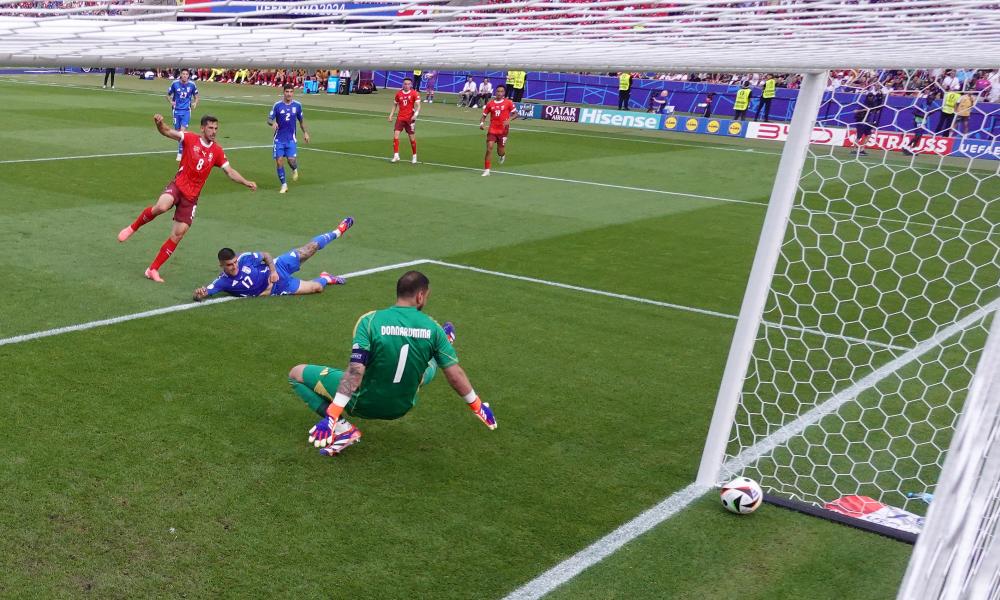
SWITZERLAND OUTCLASS ITALY TO REACH LAST EIGHT AND END THE TORMENT FOR SPALLETTI
Scarcely can a crown have weighed more heavily. Italy, the defending champions, are out, and perhaps the most crushing disappointment of all was that they barely seemed to throw a punch in the process. Remo Freuler and Ruben Vargas scored the goals either side of half-time for Murat Yakin’s magnificent Swiss team, and perhaps the most damning indictment of Italy was that by the end, it didn’t even feel like a shock.
For the first hour of this game they were overwhelmed, and for the last half-hour, who cared? There will be fingers pointed and searching questions asked. Perhaps Luciano Spalletti will get a little more time, perhaps not. But in a way this was a campaign that deserved to end because it never really began, a title defence that felt off right from the start, that no amount of quirky tinkering and impassioned arm-waving could salvage.
Related: Euro 2024: Germany v Denmark, last 16 – live
Presumably Spalletti will have some imaginative explanation for why his teams consistently fell in on themselves at this tournament, why their midfield often seemed to be made of little more than tissues and hair, why he made six changes in a crucial knockout game. And ultimately the suspicion remains that from selection to tactics to tone, Italy just got a little too crazy, tried to change too much too quickly, spinning and spinning and ultimately collapsing under the weight of their own tortured internal logic.
Nicolò Fagioli, entrusted with the Jorginho role in midfield, was badly exposed. Gianluca Mancini had a shocker in defence. Mattia Zaccagni scored a brilliant match-saving goal against Croatia on Monday and was rewarded with a place on the bench, only making his appearance after Stephan El Shaarawy spent 45 minutes strolling around like a man who had walked into the wrong wedding.
If the theory was unintelligible, then the practice was even worse. Pinned back into their own half by Switzerland’s clever lop-sided attack, Italy spent large periods of the game simply surviving, biding time. Gianluca Scamacca had to wait until the 48th minute for his first touch in the opposition half, and when he finally got his first sight of goal 16 minutes from time, tapped a shot tamely against the post from five yards.
For Yakin, a tactical triumph: an aggressive pressing system that scented Italy’s weaknesses and squeezed them with a sadistic relish, clever rotations and patterns. Ricardo Rodriguez would often advance from left centre-half to form a triangle with Michel Aebischer and Vargas, leaving Italy swamped on that flank: baffled, bereft, pawing at air. Both goals came from that side, and as a by-product Federico Chiesa was neutered as an attacking threat for an hour.
And yet until Freuler’s goal it was possible to speculate if Switzerland really had the killer instinct to make their superiority tell. There were near misses, bad decisions, botched final balls. Breel Embolo, one of those strikers who always looks better to the naked eye than his scoring record would suggest, missed a glaring one-on-one chance when he semaphored his intentions to Gianluigi Donnarumma.
But in retrospect, the clock was ticking. Eight minutes before half-time Switzerland located their composure in the final third: Aebischer with the low cross, Freuler with the well-timed run and the slammed left-footed finish. Perhaps the defining motif of this goal, and Italy’s tournament was Alessandro Bastoni and Giovanni Di Lorenzo both pointing into the same space, each warning the other of an overlapping run that neither could be bothered to cover himself.
Still, half-time beckoned. For Italy, an opportunity for a regroup and a rethink. Some wise words from Spalletti. Roars, fist-bumps and back-slaps in the dressing room. And then, 27 seconds into the second half, a second Switzerland goal. Italy attempted some elaborate rugby-style kick-off routine, Fagioli gave the ball straight to a Swiss player, and after a simple triangle of passes on the left, Vargas curled in beautifully.
And that was that, really. Italy dominated the closing stages of the game in terms of possession, and even had a couple of chances. Scamacca hit the post; Fabian Schär did the same with a misjudged defensive header; and yet as the substitutes rolled off and on, and Italy unleashed their gentle, innocuous waves of passing, it was almost with the acquiescence of their opponents. Italy were saving a little face; Switzerland were saving a little energy. It was a stasis that suited everybody.
As for the Swiss, this is a team that can genuinely go the distance. The goals have been pleasingly spread across the pitch; the defence with Manuel Akanji at its heart looks teak-tough; Granit Xhaka is three good games away from being a very good shout from the Ballon d’Or. All they really need is belief: so often Switzerland feel like a team that thrives when the going gets tough and regress as soon as conditions improve. A potential match-up against England in the quarter-finals might just bring the best out of them.
2024-06-29T19:18:39Z dg43tfdfdgfd